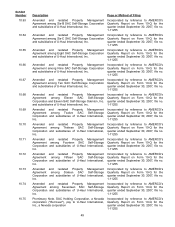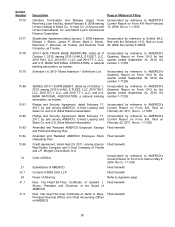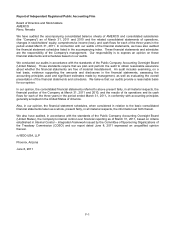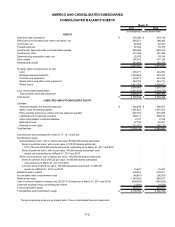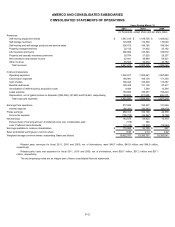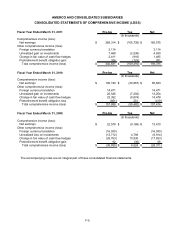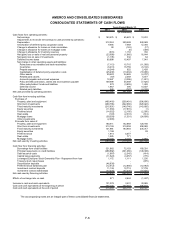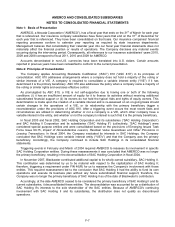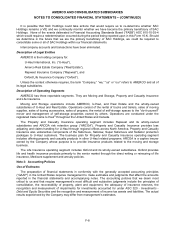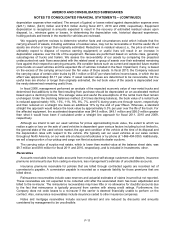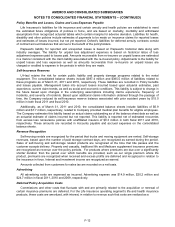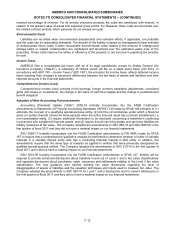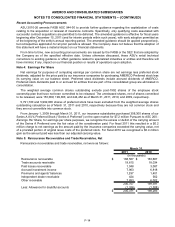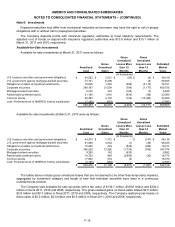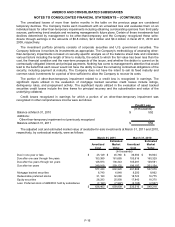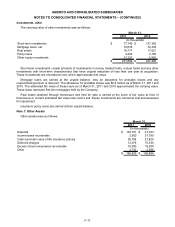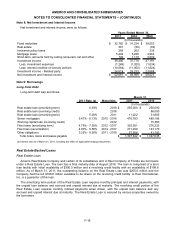U-Haul 2011 Annual Report Download - page 64
Download and view the complete annual report
Please find page 64 of the 2011 U-Haul annual report below. You can navigate through the pages in the report by either clicking on the pages listed below, or by using the keyword search tool below to find specific information within the annual report.AMERCO AND CONSOLIDATED SUBSIDIARIES
NOTES TO CONSOLIDATED FINANCIAL STATEMENTS -- (CONTINUED)
It is possible that SAC Holdings could take actions that would require us to re-determine whether SAC
Holdings remains a VIE and we continually monitor whether we have become the primary beneficiary of SAC
Holdings. None of the events delineated in Financial Accounting Standards Board (“FASB”) ASC 810-10-35-4
which would require a redetermination occurred during the period being reported upon in this Form 10-K. Should
we determine in the future that we are the primary beneficiary of SAC Holdings, we could be required to
consolidate some or all of SAC Holdings within our financial statements.
Intercompany accounts and transactions have been eliminated.
Description of Legal Entities
AMERCO is the holding company for:
U-Haul International, Inc. (“U-Haul”),
Amerco Real Estate Company (“Real Estate”),
Repwest Insurance Company (“Repwest”), and
Oxford Life Insurance Company (“Oxford”).
Unless the context otherwise requires, the term “Company,” “we,” “us” or “our” refers to AMERCO and all of
its legal subsidiaries.
Description of Operating Segments
AMERCO has three reportable segments. They are Moving and Storage, Property and Casualty Insurance
and Life Insurance.
Moving and Storage operations include AMERCO, U-Haul, and Real Estate and the wholly-owned
subsidiaries of U-Haul and Real Estate. Operations consist of the rental of trucks and trailers, sales of moving
supplies, sales of towing accessories, sales of propane, the rental of self-storage spaces to the “do-it-yourself”
mover and management of self-storage properties owned by others. Operations are conducted under the
registered trade name U-Haul® throughout the United States and Canada.
The Property and Casualty Insurance operating segment includes Repwest and its wholly-owned
subsidiaries and ARCOA risk retention group (“ARCOA”). Property and Casualty Insurance provides loss
adjusting and claims handling for U-Haul through regional offices across North America. Property and Casualty
Insurance also underwrites components of the Safemove, Safetow, Super Safemove and Safestor protection
packages to U-Haul customers. The business plan for Property and Casualty Insurance operating segment
includes offering property and casualty products in other U-Haul related programs. ARCOA is a captive insurer
owned by the Company whose purpose is to provide insurance products related to the moving and storage
business.
The Life Insurance operating segment includes Oxford and its wholly-owned subsidiaries. Oxford provides
life and health insurance products primarily to the senior market through the direct writing or reinsuring of life
insurance, Medicare supplement and annuity policies.
Note 3: Accounting Policies
Use of Estimates
The preparation of financial statements in conformity with the generally accepted accounting principles
(“GAAP”) in the United States requires management to make estimates and judgments that affect the amounts
reported in the financial statements and accompanying notes. The accounting policies that we deem most
critical to us and that require management’s most difficult and subjective judgments include the principles of
consolidation, the recoverability of property, plant and equipment, the adequacy of insurance reserves, the
recognition and measurement of impairments for investments accounted for under ASC 320 - Investments -
Debt and Equity Securities and the recognition and measurement of income tax assets and liabilities. The actual
results experienced by the Company may differ from management’s estimates.
F-8


